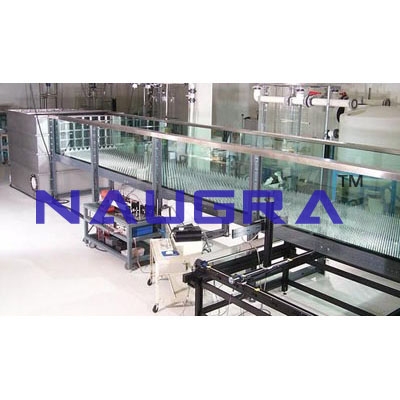- Civil Lab Mechanical Lab Engineering Lab Equipments
- sales@didacticlabequipments.com

CAT NO: DIDACTICNLE-Export-205085
Computer Controlled Flow Channels (section: 80 x 300 mm).(several lengths)
Exercises and Practical Possibilities to be done with Main Items
1.- Measurement of the water height and the velocity along the channel.
2.- Measurement of the flow with weirs of thin wall.
3.- Measurement of flow with changes in the channel section.
4.- Measurement of flow using Venturi flume.
5.- Control of the flow by gates.
6.- Level control using syphons.
7.- Flow on overflow dams.
8.- Flow among the pillars of a bridge.
9.- Connection of a channel to a culvert.
10.- Characterization of the hydraulic jump.
11.- Profiles of the water free surface.
12.- Investigation of flow and supercritical flow states.
13.- Measurement of water levels.
14.- Discharge processes on an underwater weir.
15.- Amount of energy in flows in open channels.
16.- Function of a syphon weir.
17.- Flow rate and drain coefficients of a syphon weir.
18.- Pipe flows.
19.- Comparison of overflow and syphon weirs.
20.- Observation of the throw of the water.
21.- Generation of different flow states by damming the down-stream water.
22.- Observation of the flow under an undershot weir:
-Observation of hydraulic motion on discharge.
23.- Relationship between dam height and
discharge.
24.- Observation of discharges under a radial gate:
-Observation of hydraulic motion on discharge.
25.- Hydrostatic pressure on a weir.
26.- Investigations on waves.
27.- Behaviour of structures in rough sea.
28.- Applying and understanding Manning’s formula.
29.- Understanding sub- and super-critical flow.
30 Learning how to apply force-momentum and steady flow energy equations to simple flow situations.
31.- Investigation of the transition from running to shooting flow.
Additional practical possibilities:
32.- Sensors calibration.
33.- Filling of the Pitot tube.
34.- Filling of the venturi meter with analog output.
35.- Calculation of water flow.
36.- Use of level gauge for measurement of the water height.
Other possibilities to be done with this Unit:
37.- Many students view results simultaneously.
To view all results in real time in the classroom by means of a projector or an electronic blackboard.
38.- Open Control, Multicontrol and Real Time Control.
This
unit allows intrinsically and/or extrinsically to change the span,
gains; proportional, integral, derivate parameters; etc in real time.
39.- The Computer Control System with SCADA allows a real industrial simulation.
40.- This unit is totally safe as uses mechanical, electrical and electronic, and software safety devices. Fluid Mechanics Lab Equipments manufacturers.
